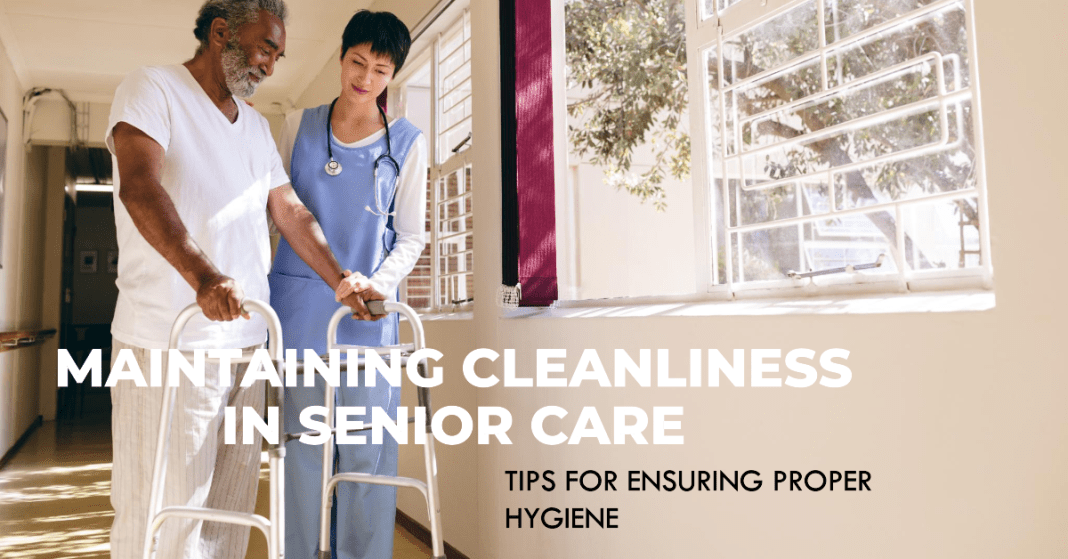Proper hygiene is essential for the health and well-being of seniors in care. As individuals age, their immune systems become weaker, making them more susceptible to infections and diseases. Maintaining good hygiene practices not only prevents the spread of illness but also helps seniors feel comfortable, dignified, and confident.
Understanding the Importance of Hygiene in Senior Care
Hygiene plays a crucial role in the overall health of seniors, especially in the context of a Senior Care Home. It is directly linked to preventing infections and promoting a higher quality of life. Poor hygiene can lead to skin infections, urinary tract infections, pneumonia, and other serious conditions. Therefore, it is imperative for caregivers and healthcare professionals to prioritize cleanliness and hygiene practices in senior care facilities.
When it comes to senior care, maintaining proper hygiene goes beyond just cleanliness. It encompasses a wide range of practices that contribute to the well-being of older adults. From personal hygiene routines to environmental cleanliness, every aspect plays a significant role in ensuring the health and comfort of seniors.
The Link Between Hygiene and Health in Seniors
There is a strong correlation between hygiene and health in seniors. Proper hygiene practices, such as frequent handwashing and regular oral care, can significantly reduce the risk of infections. Cleanliness also helps manage chronic conditions like diabetes, where maintaining good foot hygiene is crucial in preventing foot ulcers and infections.
Moreover, maintaining good hygiene habits can positively impact seniors’ mental well-being. Feeling clean and fresh can boost self-esteem and confidence, leading to a more positive outlook on life. It also promotes social interaction and reduces the risk of isolation, as seniors feel more comfortable engaging with others when they are clean and presentable.
Why Seniors are More Susceptible to Infections
Age-related changes in the immune system make seniors more vulnerable to infections. The body’s ability to fight off bacteria, viruses, and other pathogens diminishes with age. Additionally, underlying health conditions, medications, and decreased mobility can further compromise seniors’ immunity. Therefore, implementing effective hygiene protocols is of utmost importance in senior care settings.
One of the main reasons why seniors are more susceptible to infections is the natural aging process. As individuals age, their skin becomes thinner and more fragile, making it easier for bacteria and viruses to penetrate the body’s defenses. The decline in the production of natural oils and sweat can also lead to dry skin, which is more prone to cracking and infection.
Furthermore, seniors often face challenges in maintaining their hygiene due to physical limitations. Conditions such as arthritis can make it difficult to perform tasks like bathing, grooming, and dressing independently. This is where caregivers and healthcare professionals play a vital role in ensuring that seniors receive the necessary assistance and support to maintain their hygiene effectively.
Hygiene is not just a matter of cleanliness in senior care. It is a fundamental aspect of promoting the health, well-being, and dignity of older adults. By understanding the importance of hygiene and implementing effective practices, caregivers and healthcare professionals can contribute to the overall quality of life for seniors in their care.
Essential Hygiene Practices for Senior Care
When it comes to senior care, certain hygiene practices are particularly important in maintaining health and preventing infections. These practices cover multiple areas, including hand hygiene, oral care, and personal hygiene.
Hand Hygiene: The First Line of Defense
Regular and proper handwashing is crucial in preventing the spread of infections in senior care facilities. Caregivers should wash their hands thoroughly with soap and water for at least 20 seconds before and after providing care to seniors. Hand sanitizers can be used when handwashing is not readily available.
Oral Hygiene: Preventing Dental and Gum Diseases
Oral health directly impacts overall health, especially in seniors. Caregivers should assist seniors in maintaining good oral hygiene, including brushing their teeth at least twice a day and using dental floss. Regular dental check-ups are also essential in preventing dental and gum diseases.
Personal Hygiene: Maintaining Dignity and Comfort
Assisting seniors with personal hygiene tasks ensures their comfort, dignity, and overall well-being. This includes bathing, grooming, and toileting. It is important for caregivers to approach these tasks with sensitivity and respect, taking into consideration the preferences and individual needs of each senior.
Implementing Hygiene Protocols in Senior Care Facilities
To ensure proper hygiene in senior care facilities, the implementation of hygiene protocols is essential. This involves staff training, regular hygiene checks, and audits to maintain cleanliness and prevent the spread of infections.
Staff Training for Effective Hygiene Management
Providing comprehensive training to caregivers and staff members is crucial in promoting effective hygiene management. Training should cover proper handwashing techniques, personal protective equipment (PPE) usage, and infection control practices. Regular refreshers and ongoing education should also be provided to keep staff updated on the latest hygiene guidelines.
Regular Hygiene Checks and Audits
Regular hygiene checks are necessary to evaluate and maintain cleanliness standards in senior care facilities. Audits should include thorough inspections of common areas, resident rooms, and equipment. Identifying areas that require improvement and addressing them promptly ensures a hygienic environment for seniors.
Dealing with Common Hygiene Challenges in Senior Care
While maintaining proper hygiene in senior care is crucial, there are common challenges that caregivers may encounter. Understanding and addressing these challenges is essential in providing effective care.
Overcoming Resistance to Personal Hygiene Tasks
Some seniors may resist or have difficulties with personal hygiene tasks. This resistance can stem from physical limitations, cognitive impairments, or a sense of loss of independence. Caregivers should approach these challenges with empathy and patience, providing support and adapting the approach to meet the individual’s needs.
Managing Incontinence and Hygiene
Incontinence is a common issue among seniors, which can affect their hygiene and overall well-being. Caregivers should prioritize proper continence management, including timely changing of adult diapers or pads, regular cleansing, and maintaining moisture-free skin to prevent skin breakdown and infections.
The Role of Caregivers in Maintaining Hygiene
Caregivers play a crucial role in maintaining the hygiene of seniors. They not only provide assistance with daily hygiene tasks but also promote hygiene habits and protect themselves and others from potential infections.
Encouraging Hygiene Habits in Seniors
Caregivers should encourage seniors to participate in their own hygiene routines to maintain their independence and self-esteem. Simple practices like reminding seniors to wash their hands frequently, offering them choices in personal care products, and providing positive reinforcement can go a long way in promoting good hygiene habits.
Caregiver Hygiene: Protecting Yourself and Others
Caregivers must prioritize their own hygiene to prevent the spread of infections. This includes proper hand hygiene, using personal protective equipment (PPE) when necessary, and following infection control guidelines. By protecting themselves, caregivers can also protect the seniors they care for and their colleagues.
Conclusion
Ensuring proper hygiene in senior care is crucial for maintaining the health, comfort, and dignity of seniors. By understanding the importance of hygiene, implementing effective protocols, overcoming challenges, and prioritizing caregiver hygiene, we can create a safe and hygienic environment for seniors in care. Remember, good hygiene practices not only prevent the spread of infections but also contribute to an improved quality of life for seniors.





